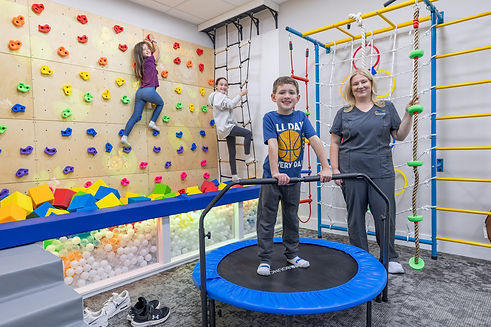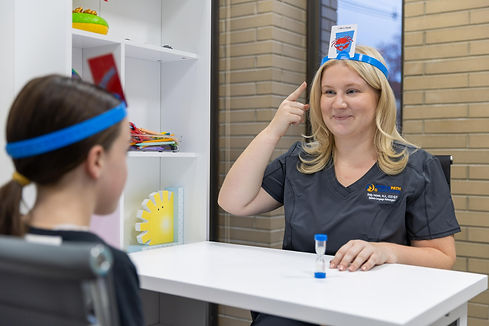
Why Early Intervention With Speech Therapy and Occupational Therapy in School-Aged Children Leads to Significant Academic Growth?
Give Your Child a Strong Start Through Early Speech Therapy and Occupational Therapy
When a child starts showing speech delays or struggles with simple motor skills, it can raise significant concern for parents. But here’s the proactive solution: early intervention through speech and occupational therapy can make a measurable difference in how well that child performs later in school.
Many studies show that when children get early speech and language intervention, their language, learning, and classroom participation improve dramatically, often by 30% to 60% improvement compared to children who didn’t receive early support. Further information on the average improvement seen in early intervention outcomes can be found in the Early Intervention Review, 2024
What Early Intervention with Speech Therapy and Occupational Therapy Actually Does to a Child with Speech Challenges?
The first few years of a child’s life are a period of rapid brain growth. During this stage, the brain forms strong connections that support speech, movement, and learning. When therapy starts early, it helps strengthen these connections before challenges have an academic impact.
Speech and Language Therapy Helps with:
-
Building vocabulary and sentence structure
-
Improving articulation and speech clarity
-
Helping children understand and express their thoughts (expressive/receptive language)
-
trengthening pre-reading and communication skills
Occupational Therapy Helps with:
-
Improving fine motor skills (like holding a pencil, buttoning, or feeding independently)
-
Supporting sensory regulation and attention
-
Building coordination, balance, and body awareness
-
Preparing children for school tasks like writing, focusing, and following instructions.
Together, these therapies help your child communicate more effectively, stay engaged for more extended periods, and build independence, all of which directly support stronger academic performance later on.

The Impact on Academic Growth of a Child Through Speech Therapy and Occupational Therapy
Research from extensive studies, such as the National Early Intervention Longitudinal Study (NEILS), has found that children who received early therapy were significantly less likely to require special education support later. In some groups, the difference was close to 40–50%.

Follow directions more easily


Participate in group activities with confidence


Focus longer during school lessons
Engage in writing, reading, and class discussions
Build positive relationships with peers and teachers
Develop expressive communication methods
This represents the real academic advantages that early therapy provides — including stronger language, better classroom behavior, and smoother learning transitions.
A Real-World Example of How Early Speech & Occupational Therapy Shaped a Child’s Future Skills
A 4-year-old child presented with challenges in speech clarity and fine motor skills, such as difficulty holding a crayon properly. After initiating a combined therapy approach involving speech and occupational therapy:
Speech Therapy Outcomes:
● Improvement in Language Skills:
A study found that children receiving speech therapy showed significant improvements in language skills. For instance, after 10 sessions, language skill scores improved by 89.3%. PMC speech therapy article.
● Enhanced Communication:
Another study reported that 77.1% of children demonstrated improvement in at least one domain of therapy outcome measures over 36 months. PMC speech therapy article
Occupational Therapy Outcomes:
● Fine Motor Skill Development:
Early occupational therapy enhances fine motor skills, such as holding a crayon or performing daily tasks. Studies show that goal-oriented play and targeted exercises significantly enhance these skills in preschool children (Frontiers in Neurology, Frontiers in Psychology).
● Functional Gains:
Higher-intensity early interventions are associated with improved functional outcomes, including motor, cognitive, and social skills (Early Childhood Research Quarterly, Frontiers in Psychology).
Hear from Dr. Mary Barbera, a leading child development expert, on how early intervention in speech and motor skills can help toddlers thrive.
The Step-by-Step Process of Speechpath & Associates to Help Improve Your Child’s Speech
At SpeechPath & Associates, we combine proven therapy strategies with a warm, family-focused approach. Our therapists collaborate to create a personalized plan tailored to your child’s specific needs. Here’s what that includes:
1
Comprehensive Evaluations
We identify areas where your child struggles and their existing strengths.
2
Customized Therapy Plans
Every session is designed to target your child’s specific goals — from speech clarity to handwriting.
3
Integrated SLP + OT Support
Our team coordinates sessions to maximize progress in both communication and motor skills.
4
Play-Based Learning Approaches
Therapy feels fun, natural, and engaging — helping children learn without pressure.
5
Parental Guidance
Sessions
We teach parents how to support their child's progress at home through simple daily activities.
6
Progress Tracking and Improvement
We measure growth regularly so that you can see the real improvements in communication, focus, and school readiness.



Give Your Child the Head Start They Deserve — Schedule a Personalized Evaluation Today!
If you’ve noticed signs of speech delay, poor coordination, or difficulty focusing, don’t wait. Contact SpeechPath & Associates today at (908) 516-0825 or fill out our brief form to book a speech evaluation for your child and a personalized plan that helps your child thrive.